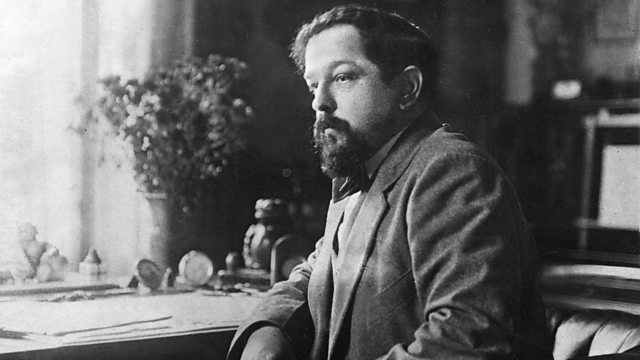
Mme Vasnier
Donald Macleod discusses Debussy's relationship with Madame Vasnier, the muse who inspired many of his early songs.
Debussy's muse Mme Vasnier inspired the young composer, barely into his twenties, to produce twenty-seven of the forty-odd songs he wrote between 1880 and 1884.
Over the course of the week Donald Macleod explores the musical fruits of Debussy's friendships with the society hostess Madame Vasnier, writer Pierre Louÿs, poets Stéphane Mallarmé and Maurice Maeterlinck and the ballet impresario Sergei Diaghilev.
Born in 1862, Debussy's childhood was overshadowed by periods of uncertainty and poverty. His father Manuel was in and out of employment and his mother was obliged to work as a seamstress to make ends meet. During the Commune, Debussy's father enlisted in the National Guard but family life hit a further stumbling block after the movement was crushed in 1871 as Manuel Debussy was put on trial and imprisoned. On identifying a natural talent and a potential income, young Debussy was steered towards a career as a concert pianist. He began his studies at the Paris Conservatoire at the age of 10, the twelve or so years he spent there being the only formal education he received. By the time he graduated he had made many useful contacts, some of whom we'll encounter across this week, as well as coming to the conclusion that he should focus on composition rather than performance.
Moonlight, evening and the trials and tribulations of love were subjects that preoccupied Debussy as a young man. Setting texts by the Parnassian poets, he wrote prolifically, with Madame Vasnier's high, soaring soprano voice very much in mind. With Donald Macleod.
Debussy, orch. André Caplet
Clair de lune
Orchestra National de Lyon
Jün Markl, conductor
Fantoches
Donna Brown, soprano
Stéphane Lemelin, piano
Trio in G, 1st movement - Andantino con moto allegro
The Florestan Trio
La Damoiselle élue
Ileana Cotrubas, soprano
Glenda Maurice, mezzo
Südfunkchor und Radio-Sinfonieorchester Stuttgart
Gary Bertini, conductor
Pour le piano
Jean-Efflam Bavouzet, piano
Regret
Donna Brown, soprano
Stéphane Lemelin, piano.
Last on
More episodes
Previous
You are at the first episode
Music Played
-
![]()
Claude Debussy
Clair de lune
Orchestra: Orchestre national de Lyon. Conductor: Jun Märkl.- Naxos 8572583.
- Naxos.
- 3.
-
![]()
Claude Debussy
Fantoches
Performer: Stéphane Lemelin. Singer: Donna Brown.- Atma Classique 2209.
- Atma Classique.
- 12.
-
![]()
Claude Debussy
Trio in G minor
Ensemble: The Florestan Trio.- Hyperion CDA67114.
- Hyperion.
- 4.
-
![]()
Claude Debussy
La damoiselle elue
Singer: Ileana Cotrubaș. Singer: Glenda Maurice. Conductor: Gary Bertini. Orchestra: South-West German R S O.- Orfeo C012821.
- Orfeo.
- 1.
-
![]()
Claude Debussy
Pour le piano
Performer: Jean-Efflam Bavouzet.- CHANDOS : CHAN-10743.
- CHANDOS.
- 2.
-
![]()
Claude Debussy
Regret
Performer: Stéphane Lemelin. Singer: Donna Brown.- Virgin Classics 7307682.
- Virgin Classics.
- 13.
Broadcasts
- Mon 22 Feb 2016 12:00����ý Radio 3
- Mon 22 Feb 2016 18:30����ý Radio 3
Beethoven Unleashed – the box set
What was really wrong with Beethoven?
Composers A to Z
Who knew? Five eye-opening stories from Composer of the Week
Five reasons why we love Parry's Jerusalem
What is the strange power of Jerusalem which makes strong men weep?
A man out of time – why Parry's music and ideas were at odds with his image...
The composer of Jerusalem was very far from the conservative figure his image suggests.
Composer Help Page
Find resources and contacts for composers from within the classical music industry.





